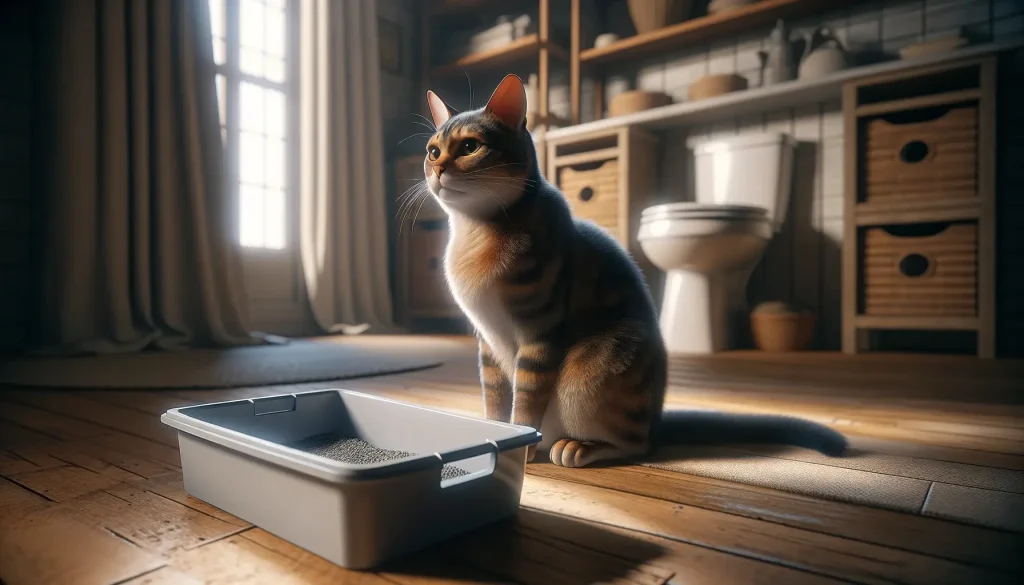
Cat’s Litter Box Issues
It’s not uncommon for cat owners to face the frustrating dilemma of their feline friend choosing spots outside their litter box for their bathroom needs. This behavior can stem from a variety of behavioral and medical causes. The key to solving this issue lies in understanding why it happens in the first place. Is it a sign of a medical condition, a reaction to the litter box setup, or perhaps stress-related? Identifying the root cause is crucial for effectively addressing the problem and reinstating harmony in your pet’s life and your home.
The reasons for this behavior can be broadly classified into four categories:
- Medical Issues: Conditions such as arthritis, urinary tract infections, and gastrointestinal problems can discourage your cat from using their box. These health issues can make the act of climbing into or squatting in the litter box painful or uncomfortable.
- Litter Box Aversion: An unclean litter box, an unfavorable change in the litter type, or an inconvenient box location can make your cat look for other places to relieve themselves.
- Anxiety or Stress: Changes in the household, such as new pets, moving, or even alterations in the daily routine, can lead to stress-induced avoidance of the litter box.
- Territorial Marking: A natural behavior in cats, sometimes they mark territories outside their litter box, especially if there are new animals in the house. This is more common in cats that are not neutered or spayed.
Addressing your cat’s litter box issues effectively involves a combination of veterinary consultation to rule out medical problems, adjustments in the litter box management, and efforts to reduce stress in your cat’s environment. But what specific steps can you take to not only identify these causes but also apply the right fixes? Let’s dive deeper into understanding and resolving your cat’s litter box mysteries.

Litter Box Tips for Happy Cats
Ensuring your cat uses their litter box every time involves understanding their needs and setting up the right environment. Here are critical tips to keep your feline friends satisfied and prevent unwanted messes.
Maintain Ultimate Cleanliness:
- Regular scooping is a must. At least once a day keeps the box inviting and prevents litter box aversion.
- Complete wash-outs are crucial too. Wash the box with mild detergent weekly to avoid lingering smells.
Choose the Right Litter:
- Cats can be particular about litter. Some prefer clumping, others non-clumping, and some might even have a scent preference.
- Experiment with different types to see which one your cat prefers. A sudden change can cause aversion, so introduce new options gradually.
Location, Location, Location:
- The litter box location matters. Quiet, low-traffic areas are best. Avoid placing it near your cat’s food and water, as cats prefer these areas to be separate.
- Multiple cats? Multiple boxes. The general rule is one box per cat plus one extra. Spread them out to prevent territorial disputes.
Consider Box Type and Size:
- Some cats dislike covered boxes due to the trap of odors inside. Others might feel safer enclosed. Offer options to suit your cat’s preference.
- Ensure the box is big enough. Cats should have plenty of room to turn around, squat, and stand without feeling cramped.
Monitor and Respond to Health Signs:
- Changes in litter box behavior could signal health issues. Watch for signs of discomfort or attempts to urinate with no result.
- Increased frequency in cleaning or a sudden dislike for the box might require a vet visit to rule out medical issues.
Adopting these practices will not only make your cat’s litter box appealing but also help you stay ahead of potential problems. Keeping a close eye on your cat’s litter box behavior and preferences sets the foundation for a clean home and a happy pet.
Beginner Guide to Raising Quail at Home
What are the Signs of a Dog Concussion?
What Causes Your Dog’s Ears to Smell Bad?
When your dog’s ears start to emit an unpleasant odor, it might leave you puzzled…
Methimazole Treatment for Cat Hyperthyroidism
Methimazole plays a crucial role in managing feline hyperthyroidism, a condition marked by an overactive…
Got Hummingbirds in your Backyard? Here’s How to Care for Them.
Why Does Your Cat Pee Outside the Litter Box?
Cat’s Litter Box Issues It’s not uncommon for cat owners to face the frustrating dilemma…



